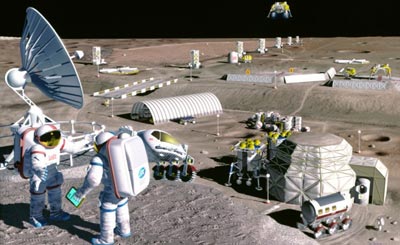Auctions, races, and space settlementby Alan Wasser
|
| If you want something done as soon as possible, reward success, not promises. |
Naturally, I’m glad that he agrees that if we got Congress to pass the Space Settlement Initiative it would set off a race to return to the Moon and go on to Mars. Still, I can’t help asking, if, God forbid, someone you loved had a currently incurable fatal disease, and the government was going to try to encourage the development of a cure for that disease, how would you want them to do that? Would you want them to hold an auction to sell, to the highest bidder, the exclusive franchise to develop a cure for that disease? That would avoid the “wastefulness” involved in having a competitive race, in which many drug companies all try different ways to find a cure, in order to win the rich prize the patent laws now award for being first.
Still, I suspect that, in that case, even the Chief Economist of Optimal Auctions would prefer a race because it is more likely to produce a cure, faster. That’s how I feel about setting up a competitive race to develop transport to the Moon. If you want something done as soon as possible, reward success, not promises.
In any case, I still believe no one can auction land on the Moon—not even the UN, as you’ll see below—until after transport has been developed. That’s because no one can own land on the Moon, at least until it is occupied and in use, and no one can auction what they don’t own. As discussed in http://spacesettlement.org/#06 and http://spacesettlement.org/#07 it wouldn’t be worth anything until then anyway.
Dinkin writes:
Reasonable investors might put the probability of lunar tourism being a $30B market by 2030 at 33%. If such an investor gets a monopoly franchise for all tourist flights to the Moon and can serve everyone at a 20% profit, they would value the concession at $6B/year if the market materializes and would be willing to make an upfront bid worth the net present value of $2B/year after 2030 in order to buy the franchise.
However, that arithmetic counts only the cost of the franchise, implicitly assuming a zero cost of developing the transport, etc. necessary to serve that tourist market. In reality, those costs could easily come to much more than that whole $30 billion, and could take decades to develop, especially with no race to spur innovation. No reasonable investor would bid $20,000, let alone $2,000,000,000, for such a franchise until after the transportation actually existed. Similarly, the other forms of options or property rights Dinkin considers would all be worth just nickels and dimes until after the transport has been developed and the Moon is in use and occupation.
By the way, several corrections about the Outer Space Treaty:
Article IV says: “States Parties to the Treaty undertake not to place in orbit around the earth any objects carrying nuclear weapons or any other kinds of weapons of mass destruction, install such weapons on celestial bodies, or station such weapons in outer space in any other manner.” So kinetic weapons, or any other WMD, are just as prohibited as nuclear weapons.
| No reasonable investor would bid $20,000, let alone $2,000,000,000, for a lunar tourism franchise until after the transportation actually existed. |
Article XII says: “All stations, installations, equipment and space vehicles on the moon and other celestial bodies shall be open to representatives of other States Parties to the Treaty on a basis of reciprocity. Such representatives shall give reasonable advance notice of a projected visit, in order that appropriate consultations may be held and that maximum precautions may be taken to assure safety and to avoid interference with normal operations in the facility to be visited.”
So, until and unless that gets amended or superseded by a settlement’s own laws, you can regulate visitors, and maybe even charge them, but you can’t absolutely exclude them from your property, regardless of what you or I would prefer.
Dinkin writes:
Without withdrawing from the Outer Space Treaty, an international organization could be developed that is consistent with both individual property rights and the Outer Space Treaty. Imagine that there is a new Lunar Land Office with a UN charter or a coalition of the willing that are signatories to its charter. That Land Office can make a claim of the Moon on behalf of all the citizens of Earth.
Actually, it couldn’t. Even if it were possible to actually get the other nations to agree to such a thing, (which it certainly would not be possible to do) it still wouldn’t get around the Treaty.
Article XIII says, “The provisions of this Treaty shall apply… whether such activities are carried on by a single State Party to the Treaty or jointly with other States, including cases where they are carried on within the framework of international inter-governmental organizations.”
Bottom line, there is no way any Earth government, or group of governments, can claim sovereignty and auction off the Moon before it is settled. Therefore, please call your Congressman and Senators today and ask them to sponsor the Space Settlement Initiative as proposed by the Space Settlement Institute.
